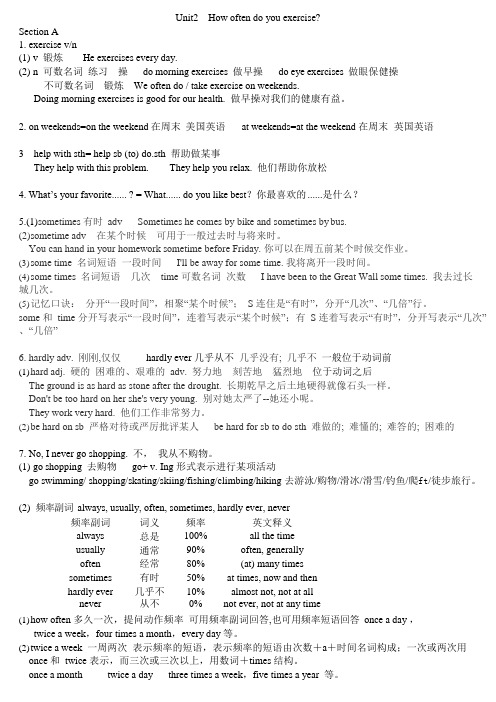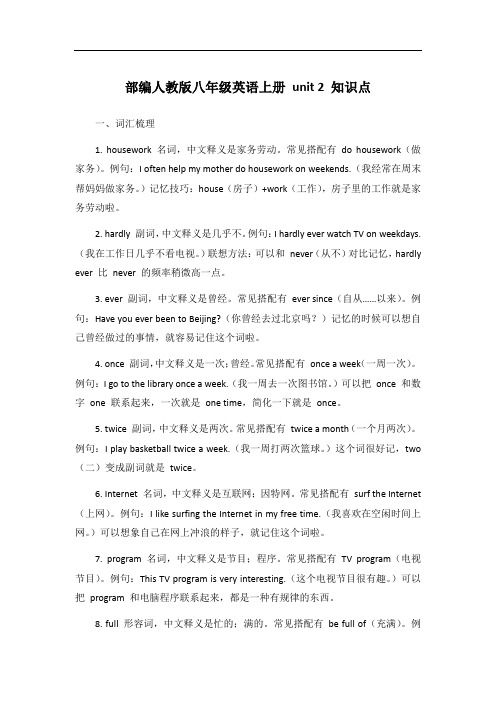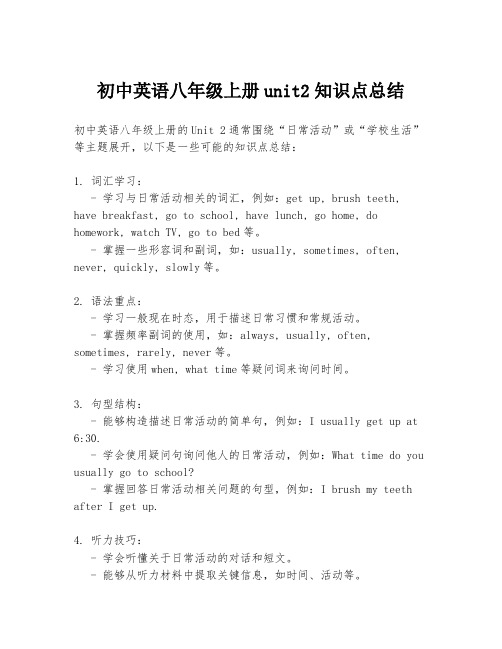八年级上册英语2单元完整复习 所有知识点
八年级上册英语Unit2单元知识点

八年级上册英语Unit2单元知识点把握好八年级英语Unit2单元知识点,会让你的英语Unit2单元的成绩得到提升。
以下是店铺给你推荐的八年级上册英语Unit2单元知识点归纳,希望对你有帮助!Unit2单元知识点:语言目标● What’s the matter? I have a headache.● You should drink some tea. The sounds like a good idea.● I have a sore back. That’s too bad .● I hope you feel better soon.● head, nose, eye, ear, tooth, neck, stomach, back, leg, arm, foot, throat● thirsty, stressed out,/ dentist, lie, rest, honey, water, illness, advice.● cold, fever, headache, toothache, stomachache, sore throat Unit2单元知识点:应掌握的词组1. Have a cold 感冒2. sore back 背痛3. neck and neck 并驾齐驱,齐头并进4. I have a stomachache 我胃痛= I have got a stomachache = There is something wrong with my stomach= My stomach hurts = I have (got) a pain in my stomach5. What’s the matter? 怎么了?= What’s the trouble (with you)? = What’s your trouble?= What’s wrong (with you)?= What’ the matter (with you)? =What has happened to you?= Is there anything wrong (with you)? = what’s up?6. sore throat 咽喉痛7. lie down and rest 躺下休息8. see a dentist 看牙医9. drink lots of water 多喝水10. hot tea with honey 加蜂蜜的热茶11.That’s a good idea 好主意12.That’s too bad 太糟糕了13.I think so 我认为如此14. I’m not feeling well. 我觉得不太舒服= I’m not feeling fine/all right. = I’m feeling ill/sick. =I feel terrible/bad.= I don’t feel well.15. get some rest 多休息Unit2单元知识点:应掌握的句子1. What’s the matter? I have a bad cold. 你怎么了?我得了重感冒。
人教版新课标八年级上册英语Unit2知识点归纳

人教版新课标八年级上册英语Unit2知识点归纳人教版新课标八年级上册英语Unit 2知识点归纳Unit 2 hat’s the atter?【复习目标】●掌握身体各部位名称的英表达方式●能表述身体的种种不适以及对他人身体的种种不适给予适当的建议【语言目标】● hat’s the atter? I have a headahe.● yu shuld drink se tea. The sunds like a gd idea.● I have a sre bak. That’s t bad .● I hpe yu feel better sn.【重点词汇】● head, nse, eye, ear, tth, nek, stah, bak, leg, ar, ft, thrat● thirsty, stressed ut,/ dentist, lie, rest, hney, water, illness, advie.● ld, fever, headahe, tthahe, stahahe, sre thrat【应掌握的词组】1. Have a ld 感冒2. sre bak 背痛3. nek and nek 并驾齐驱,齐头并进4. I have a stahahe 我胃痛= I have gt a stahahe = There is sething wrng with y stah= y stah hurts = I have (gt) a pain in y stah5. hat’s the atter? 怎么了?= hat’s the truble (with yu)? = hat’s yur truble?= hat’s wrng (with yu)?= hat’ the atter (with yu)? =hat has happened t yu?= Is there anything wrng (with yu)? = what’s up?6. sre thrat 咽喉痛7. lie dwn and rest 躺下休息8. see a dentist 看牙医9. drink lts f water 多喝水10. ht tea with hney 加蜂蜜的热茶11.That’s a gd idea 好主意12.That’s t bad 太糟糕了13.I think s 我认为如此14. I’ nt feeling well. 我觉得不太舒服= I’ nt feeling fine/all right. = I’ feelingill/sik. =I feel terrible/bad.= I dn’t feel well.15. get se rest 多休息16. I have n idea = I dn’t knw 我不知道17. stressed ut 筋疲力尽18. I a tired 我累了 He is tired. 他累了19. a healthy lifestyle健康的生活方式20. traditinal hinese dtrs传统中医21. a balane f yin and yang阴阳调和22. yu have t uh yin.你阴气太盛23. t eat a balane diet饮食平衡24. healthy fd 健康食品25. stay healthy 保持健康=keep healthy=keep in gd health = keep fit26. eny neself (yself, yurself, herself, hiself, theselves, urselves, itself反身代词) 玩得高兴,过得愉快=have a gd tie = have a wnderful tie = have fun27. eny sth. =like sth. (名词)喜欢某物,eny ding sth.喜欢做某事=like ding sth pratie ding sth.练习做某事,ind ding sth. 介意做某事, finish ding sth.完成某事,give up ding sth.放弃做某事, an’t help ding sth.忍不住做某事,keep ding sth. 坚持做某事. (keep n ding sth. / keep sb. ding sth. )be busy ding sth. 忙着做某事 be used t ding sth.习惯于做某事ake a ntributin t ding sth.为..做贡献g n ding sth. 继续做某事 frget ding sth.忘记做过某事reeber ding sth. 记得做过某事 spend....(in) ding sth. 花(时间)做某事prefer ding sth.t ding sth.比起(做...)更愿意(做...)28. at the ent = nw 此刻29. Hst faily 东道家庭30. nversatin pratie会话练习31. I’ srry t hear that.听到此事我很难过【应掌握的句子】1. hat’s the atter? I have a bad ld. 你怎么了?我得了重感冒。
(完整版)新版新目标英语八年级上册unit2知识点总结,推荐文档

Unit2 How often do you exercise?Section A1.exercise v/n(1)v 锻炼He exercises every day.(2)n 可数名词练习操do morning exercises 做早操do eye exercises 做眼保健操不可数名词锻炼We often do / take exercise on weekends.Doing morning exercises is good for our health. 做早操对我们的健康有益。
2.on weekends=on the weekend 在周末美国英语at weekends=at the weekend 在周末英国英语3 help with sth= help sb (to) do.sth 帮助做某事They help with this problem. They help you relax. 他们帮助你放松4. What’s your favorite...... ? = What...... do you like best?你最喜欢的......是什么?5.(1)sometimes 有时adv Sometimes he comes by bike and sometimes by bus.(2)sometime adv 在某个时候可用于一般过去时与将来时。
You can hand in your homework sometime before Friday. 你可以在周五前某个时候交作业。
(3)some time 名词短语一段时间I'll be away for some time. 我将离开一段时间。
(4)some times 名词短语几次time 可数名词次数I have been to the Great Wall some times. 我去过长城几次。
部编人教版八年级英语上册 unit 2 知识点

部编人教版八年级英语上册unit 2 知识点一、词汇梳理1. housework 名词,中文释义是家务劳动。
常见搭配有do housework(做家务)。
例句:I often help my mother do housework on weekends.(我经常在周末帮妈妈做家务。
)记忆技巧:house(房子)+work(工作),房子里的工作就是家务劳动啦。
2. hardly 副词,中文释义是几乎不。
例句:I hardly ever watch TV on weekdays.(我在工作日几乎不看电视。
)联想方法:可以和never(从不)对比记忆,hardly ever 比never 的频率稍微高一点。
3. ever 副词,中文释义是曾经。
常见搭配有ever since(自从……以来)。
例句:Have you ever been to Beijing?(你曾经去过北京吗?)记忆的时候可以想自己曾经做过的事情,就容易记住这个词啦。
4. once 副词,中文释义是一次;曾经。
常见搭配有once a week(一周一次)。
例句:I go to the library once a week.(我一周去一次图书馆。
)可以把once 和数字one 联系起来,一次就是one time,简化一下就是once。
5. twice 副词,中文释义是两次。
常见搭配有twice a month(一个月两次)。
例句:I play basketball twice a week.(我一周打两次篮球。
)这个词很好记,two (二)变成副词就是twice。
6. Internet 名词,中文释义是互联网;因特网。
常见搭配有surf the Internet (上网)。
例句:I like surfing the Internet in my free time.(我喜欢在空闲时间上网。
)可以想象自己在网上冲浪的样子,就记住这个词啦。
人教版八年级上册英语单元知识点归纳复习资料

人教版八年级上册英语单元知识点归纳复习资料一、词汇归纳1.八年级上册英语第一单元的重点词汇有wonderful,读音是[ˈwʌndəfl],形容词,中文释义是精彩的、美妙的。
常用搭配有wonderful trip(精彩的旅行)。
例句:We had a wonderful trip last summer.(去年夏天我们有一次精彩的旅行。
)2.还有bored,读音是[bɔːd],形容词,意思是无聊的。
常用搭配有be bored with(对……感到无聊)。
例句:I am bored with this movie.(我对这部电影感到无聊。
)3.第二单元的重点词汇是often,读音是[ˈɔːfn],副词,中文释义是经常。
常用搭配有often do sth(经常做某事)。
例句:I often go to the park on weekends.(我经常在周末去公园。
)4.hardly ever,这是一个固定短语,意思是几乎从不。
例句:I hardly ever eat junk food.(我几乎从不吃垃圾食品。
)二、语法总结1、一般现在时一般现在时表示经常发生的动作或存在的状态。
比如“I often go to school by bike.”这句话中,“go”就是一般现在时,表示经常骑自行车去上学这个动作。
规则就是当主语是第三人称单数时,动词要发生变化,比如“he goes to school by bus.”语法练习题:用所给动词的适当形式填空。
My mother ______(cook)dinner every day.(答案:cooks)2、一般过去时一般过去时表示过去发生的动作或存在的状态。
“I went to the park yesterday.”这里的“went”就是一般过去时。
规则是动词要用过去式,比如“play”的过去式是“played”。
语法练习题:She ______(visit)her grandparents last weekend.(答案:visited)三、句型解析1. What's the matter? 这个句型用于询问“怎么了?”“出什么事了?”。
初中英语八年级上册unit2知识点总结

初中英语八年级上册unit2知识点总结初中英语八年级上册的Unit 2通常围绕“日常活动”或“学校生活”等主题展开,以下是一些可能的知识点总结:1. 词汇学习:- 学习与日常活动相关的词汇,例如:get up, brush teeth, have breakfast, go to school, have lunch, go home, do homework, watch TV, go to bed等。
- 掌握一些形容词和副词,如:usually, sometimes, often, never, quickly, slowly等。
2. 语法重点:- 学习一般现在时态,用于描述日常习惯和常规活动。
- 掌握频率副词的使用,如:always, usually, often, sometimes, rarely, never等。
- 学习使用when, what time等疑问词来询问时间。
3. 句型结构:- 能够构造描述日常活动的简单句,例如:I usually get up at 6:30.- 学会使用疑问句询问他人的日常活动,例如:What time do you usually go to school?- 掌握回答日常活动相关问题的句型,例如:I brush my teeth after I get up.4. 听力技巧:- 学会听懂关于日常活动的对话和短文。
- 能够从听力材料中提取关键信息,如时间、活动等。
5. 口语表达:- 能够用英语描述自己的日常活动。
- 学会在对话中询问和回答关于日常活动的问题。
6. 阅读理解:- 阅读有关日常活动的文章或故事,理解大意和细节。
- 学会从阅读材料中找出关键信息,并回答相关问题。
7. 写作技巧:- 学会写关于自己或他人日常活动的短文。
- 使用正确的时态和句型结构来描述活动。
8. 文化意识:- 了解不同文化背景下人们的日常生活差异。
- 学会尊重和欣赏不同的生活方式和习惯。
人教英语八年级上册 2单元知识点笔记
人教英语八年级上册 2单元知识点笔记词汇- Survey (n.) - 调查,勘测。
例如:They conducted a survey to gather data.Survey (n.) - 调查,勘测。
例如:They conducted a survey to gather data.- Pronounce (v.) - 发音。
例如:He struggled to pronounce the difficult words.Pronounce (v.) - 发音。
例如:He struggled to pronounce the difficult words.- Appearance (n.) - 外貌,出现。
例如:Her appearance at the party surprised everyone.Appearance (n.) - 外貌,出现。
例如:Her appearance at the party surprised everyone.语法一般过去时一般过去时用于表示过去发生的动作或状态,通常使用动词的过去式形式。
- 肯定句结构:主语 + 动词过去式 + 其他。
- 例如:I watched a movie yesterday.- 否定句结构:主语 + 动词 "did not" + 动词原形 + 其他。
- 例如:She did not finish her homework.- 疑问句结构:Did + 主语 + 动词原形 + 其他?- 例如:Did you go to the party?交际用语- Can I ask you a question? - 我可以问你个问题吗?Can I ask you a question? - 我可以问你个问题吗?- What do you think of...? - 你觉得...怎么样?What do you think of...? - 你觉得...怎么样?- Could you repeat that, please? - 你可以再重复一遍吗?Could you repeat that, please? - 你可以再重复一遍吗?- I'm sorry, I don't understand. - 对不起,我不明白。
初中:八年级上册英语第二单元知识点复习(2019版)
初中英语新课程标准教材英语教案( 2019 — 2020学年度第二学期 )学校:年级:任课教师:英语教案 / 初中英语 / 八年级英语教案编订:XX文讯教育机构八年级上册英语第二单元知识点复习(2019版)教材简介:本教材主要用途为通过学习英语的内容,提高学生的语言技能,增加一项语言能力,有利于国际化的日常交流、生活、工作等,本教学设计资料适用于初中八年级英语科目, 学习后学生能得到全面的发展和提高。
本内容是按照教材的内容进行的编写,可以放心修改调整或直接进行教学使用。
八上unit 2知识点复习一:重点单词housework,hardly,ever,once,twice,internet,program,full,maybe,least,health,result ,percent,online,television,although, through, mind, such as, die, dentist, however, than, more than, almost, none, less, less than, point. habitafraid, exercise, free, full, spend ,afraid二:重点词组及固定搭配1;频率副词:always>usually>often>sometimes>hardly ever>never(从不)对频率副词提问用(how often:多久一次)2;看电视:watch tv3;锻炼:exercise4;帮忙做家务:help with housework5:在周末(泛指):on weekends6:在工作日(指从周一到周五):on weekdays 7;某人有空:sb be free=sb have time8:至少:at least //至多:at most9:垃圾食物:junk food10:喝牛奶/咖啡/茶:drink milk/coffee/tea 11;对….有好处:be good for…对…..有害处:be bad for…对某人友好:be good to sb对某人不友好:be bad to sb擅长….:be good at sth/doing sth和….相处得好:be good with…..12;询问某人某事:ask sb about sth13;一点也不:not…at all14:喜欢做某事:like to do sth/like doing sth15;例如:such as.16:it is +adj+(for sb)+to do sth:(对某人来说)做某事是。
人教八年级英语上册第2单元知识点总结归纳
Unit2 How often do you exercise?【重点语法】1. 频率副词: always, usually, often, sometimes, never频率副词在句中通常放在实义动词之前, be动词或助动词之后。
常用于一般现在时态中。
2.“次数”的表达方法一次 once,两次twice,三次或三次以上:基数词+ times, 如:three times, five times,3. how often“多久一次”问频率,回答常含有频率词组或短语。
常见的how疑问词:1)How soon 多久(以后)—How soon will he be back?他多久能回来?—He will be back in a month. 他一个月后能回来。
2)how long “多久”—How long did it take you to clean the house? 你打扫房子用了多久?—It took me half an hour to clean the house. 我打扫这房子用了半小时。
3)How many+名复How much+不可名“多少”问数量(how much 还可问价格)【重点短语】1. go to the movies 去看电影2. look after = take care of 照顾3. surf the internet 上网4. healthy lifestyle 健康的生活方式5. go skate boarding 去划板6. keep healthy=stay healthy 保持健康7. eating habits 饮食习惯8. take more exercise 做更多的运动9. the same as 与什么相同10. be different from 不同11. once a month一月一次12. twice a week一周两次13.make a difference to 对......有影响/作用14. most of the students=most students15. shop=go shopping=do some shopping 购物16. be good for 对......有益17. be bad for 对......有害18. come home from school放学回家19. of course = certainly = sure 当然20. get good grades 取得好成绩21. keep/be in good health 保持健康22. take a vacation 去度假【词语辨析】1. maybe / may bemaybe 是副词,意为“大概,可能,或许”,一般用于句首。
人教版八年级上册英语Unit 2 知识点语法归纳总结
Unit 2 How often do you exercise?1.短语归纳2.典句必背3.用法集萃(1)How often do you watch TV? 你多久看一次❖how often意为“多长时间一次,每隔多久”,是对句中的often, usually,every day, sometimes, never, once a week等表示频率的词或短语提问,多用于一般现在时。
例:—How often do you go to see a film? 你多久看一次电影? —Once a week. 一周一次。
❖辨析:how often, how soon, how far与how long❖辨析sometimes, some times, sometime, some time(2)Oh, I have to play tennis with my friends. 哦,我必须和我的朋友们一起打网球。
❖have to意为“必须,不得不”,强调受客观条件的影响而“不得不去做某事”。
它有人称、数和时态的变化,在变为疑问句或否定句时要借助助动词do, does或did。
例:Does she have to go home now? 现在她必须回家吗?We had t walk to shoo yesterday. 昨天我们不得不步行去了学校。
(have to强调客观需要,must表示主观愿望和看法。
)(3)They often help with housework. 他们经常帮忙做家务。
❖help with意为“在某方面帮助”,是固定短语,也可写作help sb. with sth. 表示“在某方面帮助某人”❖拓展:help相关短语(4)But my mother wants me to drink it. 但是我妈妈想要我喝它(牛奶)。
❖want sb. to do sth. 属于“动词+宾语+宾补”的固定结构。
- 1、下载文档前请自行甄别文档内容的完整性,平台不提供额外的编辑、内容补充、找答案等附加服务。
- 2、"仅部分预览"的文档,不可在线预览部分如存在完整性等问题,可反馈申请退款(可完整预览的文档不适用该条件!)。
- 3、如文档侵犯您的权益,请联系客服反馈,我们会尽快为您处理(人工客服工作时间:9:00-18:30)。
7. 垃圾食品
健康食品
junk food healthy food
8. 每天夜里睡九个小时 sleep (for) nine hours a / every night try to do sth. 9. 尽量做某事 试着做某事 try doing sth.
do /try one’s best to do sth. •咱们尽力帮助他们吧. 咱们尽力帮助他们吧. 咱们尽力帮助他们吧
拥有(不)健康的生活方式 拥有 不 健康的生活方式
4.饮食习惯 饮食习惯
eating habit(s) get good grades be the same as be different from
5. 取得好成绩 6. 与……相同 相同
与……不同 不同
different adj. 不同的 difference n. 可数名词 不同点 the difference between … ……之间的差别
You shouldn’t drink ice coffee.
•我应当躺下休息一会吗? 我应当躺下休息一会吗? 躺下休息一会吗
Should I lie down and rest?
本课时的主要语言结构如下: 本课时的主要语言结构如下:
1. What’s the matter? 2. You should / shouldn’t do …. 3. I have a …. 4. I think / don’t think …. 5. What should I do …?
Key Points
西安铁一中学 2013级英语备课组 2013级英语备课组
Grammar Focus I have a headache. You should go to bed. He has a stomachache. He shouldn’t eat anything. She has a toothache. She should see a dentist.
3. 保持健康
keep healthy = stay healthy = keep / stay in good health health n.健康 healthy adj.健康的 unhealthy adj. 不健康的 be in good health have a(n) (un)healthy lifestyle
重 点 句 型 结
It’s so cold today that I have a cold. 小
4. 我胃痛 I have a stomachache. 我胃痛.
表达生病的几种说法: 表达生病的几种说法:
= I have got a stomachache. = There is something wrong with my stomach. = Something is wrong with my stomach. = My stomach hurts. = I have (got) a pain in my stomach.
They live in a small house with a beautiful garden.
with 关于… 对于… ④.关于……;对于…… •你对结果满意吗? 你对结果满意吗? 你对结果满意吗
Are you pleased with the results?
16.传统中医 traditional Chinese doctors 传统中医
翻译下列句子。 翻译下列句子。 1. 你应该少吃肉多吃水果蔬菜。 你应该少吃肉多吃水果蔬菜。
You should eat less meat and more fruit and vegetables.
2. 我头痛。 我头痛。
I have a headache.
3. 我认为多吃水果可保持健康。 我认为多吃水果可保持健康。 4. 我该怎样做才能停止咳嗽? 我该怎样做才能停止咳嗽?
3. 我感冒了。 I have a cold. 我感冒了。 感冒” ①. cold n. 意“感冒”。 have a cold 患感冒 catch a cold get a cold ②. cold adj. 意“冷的 寒冷的”。 冷的, 寒冷的”
• 今天太冷了, 我都感冒了。 今天太冷了, 我都感冒了。
I think eating more fruit can keep healthy.
What should I do to stop my coughing?
1. 当然 2. 照顾
重点短语
of course = certainly = sure look after sb = take care of sb look after sb well = take good care of sb look at 看 look like 看起来像 look for 寻找 look over 检查(身体) 检查(身体) look up 查找 look the same 看上去一样
重 点 句 型 小 结
2. I have a sore throat. 我喉咙痛。 我喉咙痛。
①.have vt. 患(得)病(不用进行时态) 不用进行时态) • 他上周患了感冒。 他上周患了感冒。
He had a cold last week. have+ 一般情况下用 “have+a+n.” 重 表示患了某种疾病。 表示患了某种疾病。 点 句 • 我头疼。 I have a headache. 我头疼。 型 • 我肚子疼。 I have a stomachache. 小 我肚子疼。
②.用……,表示“使用某种 ……,表示“ 工具、手段” 工具、手段”等。 • 请用刀把苹果切开。 请用刀把苹果切开。 with
Please cut the apples with a knife.
with
③.带有…… 带有……
• 一件有两个口袋的外套
A coat with two pockets
• 他们住在一栋有着美丽花园的小房子里。 他们住在一栋有着美丽花园的小房子里。
for example 17.举例 举例 18.在许多西方国家 在许多西方国家 in many western countries Chinese medicine 19.中药 中药 get stressed out 21.变得有压力 变得有压力 eat a balanced diet 20.吃均衡饮食 吃均衡饮食 host family 22.寄宿家庭 寄宿家庭
5. 我觉得不舒服。 我觉得不舒服。
I'm not feeling well (at the moment). = I'm feeling ill / sick. = I feel terrible / bad. = I don't feel well
记住: ①.此句的well是adj.,表示身体状 此句的well well是 记住: 健康的。不可用good good。 况。意:健康的。不可用good。 ②. at the moment = now. .
•丝绸摸上去很柔软很舒服。 丝绸摸上去很柔软很舒服。 丝绸摸上去很柔软很舒服
Silk feels very soft and comfortable.
6.我希望你很快好起来。 我希望你很快好起来。 I hope you feel better soon .
shouldn’t = should not
情态动词 should 的用法
我们要掌握的重点如下: 我们要掌握的重点如下: 以 should 或 shouldn’t 为情态动 词的建议功能的句子。 词的建议功能的句子。该类句子中 的谓语部分由助动词 should / 动词原形构成 构成。 should not + 动词原形构成。
23.需要一些对话练习 需要一些对话练习
need some conversation practice
1. What’s the matter?
这是询问病情的常用语,类似说法还有: 这是询问病情的常用语,类似说法还有:
What’s wrong (with you)? What’s the matter ( with you ) ? What’s the trouble ( with you ) ? What’s your trouble ? What has happened to you ? Is there anything wrong ( with you )? What’s up ?
•你应该喝些蜂蜜茶。 你应该喝些蜂蜜茶。 喝些蜂蜜茶
You should drink some hot tea with honey.
情态动词 should 的用法
一样, 与情态动词 can 一样,should 的否定形式为 should + not 或 shouldn’t; 在疑问句中, shouldn’t 在疑问句中 should 放 在主语前, 在主语前 should 没有人称和数的 变化。例如: 变化。例如: •你不应该喝冰咖啡。 喝冰咖啡。 你不应该喝冰咖啡
feel 系动词 意:觉得(=be);摸上去, 觉得( ;摸上去, 后面跟形容词作表语。 后面跟形容词作表语。 •我觉得饿 / 不舒服。 我觉得饿 不舒服。
I feel hungry / sick.
•那些好话使她觉得心里很舒服。 那些好话使她觉得心里很舒服。 那些好话使她觉得心里很舒服
The good words made her feel good.
Ad v You should rest about a week.
S
P
情态动词 should 的用法
should 在本课中表示 “应该;必 应该; 用于表示忠告、建议等。例如: 须”,用于表示忠告、建议等。例如: •她累了。她应该早点睡觉。 她累了。 应该早点睡觉。 她累了 早点睡觉
